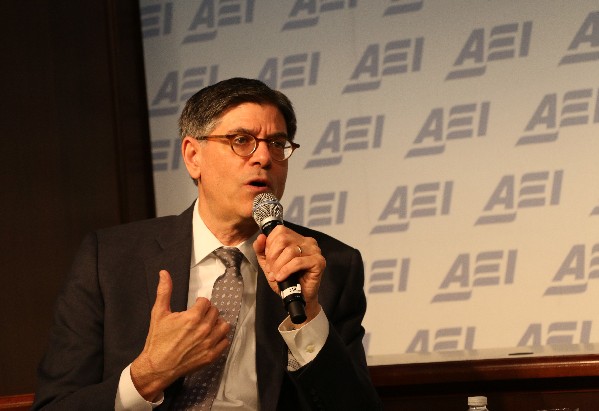
US Treasury Secretary Jack Lew talks about the US-China economic relationship on Thursday at the American Enterprise Institute in Washington.(Photo by Chen Weihua/China Daily)
Chinese and U.S. negotiating teams are talking in Washington this week about a revised negative list for a Bilateral Investment Treaty (BIT) although the agreement looks unlikely to be concluded during the remaining seven months of the Obama administration. Jack Lew, the U.S. secretary of treasury, said on Thursday that a sufficiently ambitious negative list -- where only exceptions to the treaty are specified -- from China could open a pathway to additional progress before the end of the year.
"Up till this last round, the negative list that we've seen has not been sufficiently ambitious to open enough of the economy for the BIT to have a successful path forward," he told a talk at the American Enterprise Institute (AEI) on Thursday.
He said he doesn't want to comment on something that is very much a work in progress, noting the talk had been going on over the past 24 hours.
"But they certainly led us to expect that the list will be the basis for working together going forward, even though it wouldn't be the final end result. I hope that's the case when our experts go through the list and report back," he said.
Lew hopes the Chinese take advantage of the remaining seven months of the Obama administration, noting an upcoming September meeting between President Obama and President Xi Jinping in Hangzhou on the sidelines of the G20 summit.
He noted that leaders' meetings are very useful deadlines to focus attention, but said, "I can't sit here and warrant that it will be successful."
Derek Scissors, resident scholar at AEI, believes there is no chance for the BIT to pass the U.S. Congress during Obama's remaining months in office. Most experts believe that the top priority for the U.S. government is to make a last-ditch effort to push the Congress to ratify the Trans-Pacific Partnership (TPP), a free trade agreement among 12 Pacific Rim countries that does not include China.
Scissors noted that the environment in the U.S. now is very protectionist, and the immediate priority for the next administration will be domestic issues rather than any international agenda.
He agreed that the Chinese side should be negotiating in good faith. "But you don't want to give away everything to this administration because the new administration wants to put its own stamp on it," he said.
The U.S. business community has long hoped that a BIT would help open up more of the vast China market. Many in China hope it will provide better protection to the growing Chinese investment in the U.S., especially with regard to the controversial CFIU.S. (Committee on Foreign Investment in the United States) reviews.
Some Chinese also believe a BIT would help push forward necessary economic reforms in China.
China and the U.S. are also facing a potential battle this year. While the Chinese government believes its 2001 WTO accession agreement means that it will automatically enjoy market economy status by the end of this year, Lew said, "it's not automatic" and will be reviewed and determined by the Department of Commerce.
"I said to my counterparts in China that the further you go on a reform agenda, the more likely you are going to succeed," he said.
By refusing to recognize China's market economy status, the U.S. would be able to impose arbitrary anti-dumping duties on Chinese exports, disadvantaging Chinese exporters.
Lew applauded the many achievements in U.S.-China economic relations during the Obama administration. U.S. exports to China have roughly doubled since early 2009, much faster than in any other region of the world.
China and the U.S., the two largest economies in the world, account for about a third of global output. They have also been the main engines for global growth in recent years.
Lew said both countries recognize that the future of their countries is increasingly interconnected. "Few global relationships are as important as the one between the United States and China. And few global relationships today have evolved as far and hold as much promise," Lew said.


















































